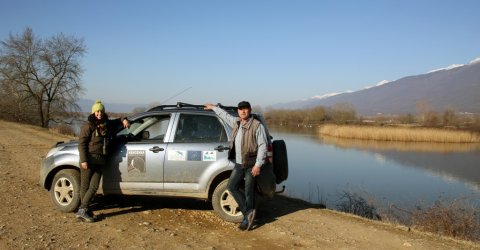
Patrolling for wildlife crime in wetlands: is it his or her job?
Having a majority of women patrolling wetlands of international importance in northern Greece in the framework of a “LIFE+” project did not happen on purpose. Responding to the need to safeguard the rarest waterbird in Europe, in September 2011, the Hellenic Ornithological Society (BirdLife Greece), took on the coordination of an ambitious multi-stakeholder flyway conservation project foreseen to last for 5 years, in which conservation actions span the entire range of the Lesser White-fronted Goose in Europe, from its breeding grounds in Scandinavia to its wintering sites in Greece. Hunting and illegal killing are recognised as major threats to the Lesser White-fronted Goose population, and patrolling units in Greece were formed to ensure that Kerkini Lake and Evros Delta, both designated Ramsar sites, remain safe for these geese.
As more suitable women than men applied for the patrolling warden posts, the patrolling units consisted primarily of females. During the application process I did consider how would these women be able to manage the predominantly male team of Forest Service guards they would be working with? And also how would they perform while conducting checks, in the middle of the night and in sub- zero temperatures, in very remote areas, and mainly dealing with hunters? The world of hunting is very much a man’s world.
Trying to combat illegal killing is not an easy feat, wherever this may be attempted. In Greece, poaching seems to coincide temporally with hunting. As hunting is performed mainly during dusk and dawn and usually during bad weather with low visibility, the chances of misidentifying and shooting protected species are high. Additionally, as hunting takes place during the winter months and usually in remote areas, the job of the patrolling warden is a difficult one. Stopping someone who does not want to be stopped, who has potentially done something illegal, and who may also carry a rifle, requires assertiveness and also a degree of diplomacy. Our experience so far shows that men, also as one would expect, are less inclined to show aggressive behaviour when stopped and confronted by a woman, and also that a more diplomatic yet still assertive approach has great value when managing a team of guards that consists mainly of men. In Greece, and in any other predominantly patriarchal society, one can use such traditional notions in gender roles to one’s benefit.
We will probably never be able to say whether one gender is more suitable than another for patrolling our wetlands. But we can most certainly recommend that a combination of the most suitable characteristics of both women and men will ensure that patrolling will be more effective and most importantly safer for those involved.
By Manolia Vougioukalou, Lesser White-fronted Goose LIFE+ Project Manager, Hellenic Ornithological Society / BirdLife Greece
© Hellenic Ornithological Society
More information here: www.wwf.fi/lwfg / https://www.facebook.com/LesserWhitefrontedGoose
The LIFE+ Nature Project “Safeguarding the Lesser White-fronted Goose Fennoscandian population in key wintering and staging sites within the European flyway” (LIFE10 NAT/GR/000638) is operating with the financial support of the European Commission and the co-financing of the Norwegian Environment Agency.